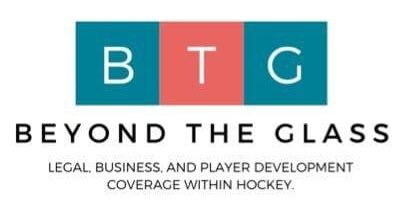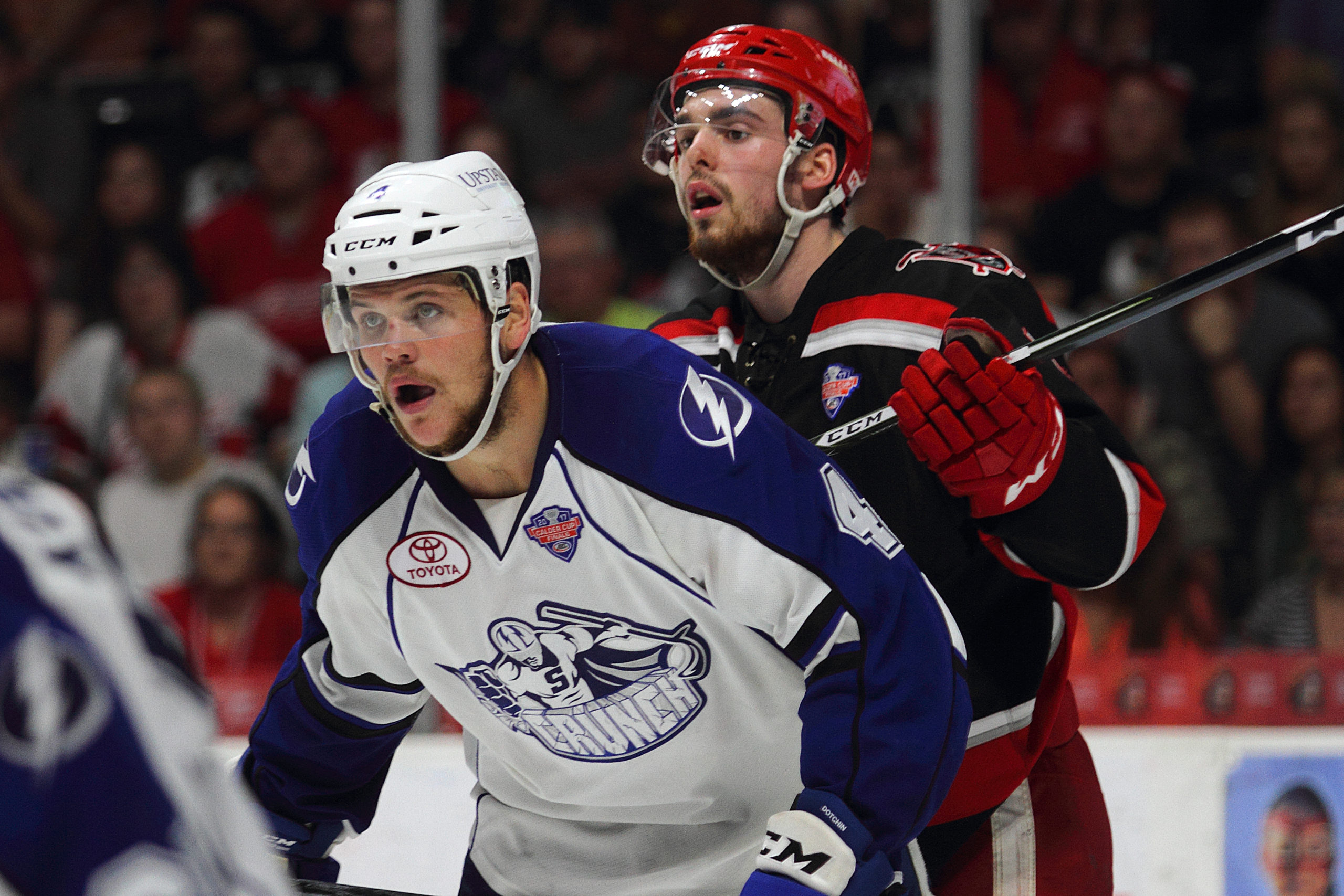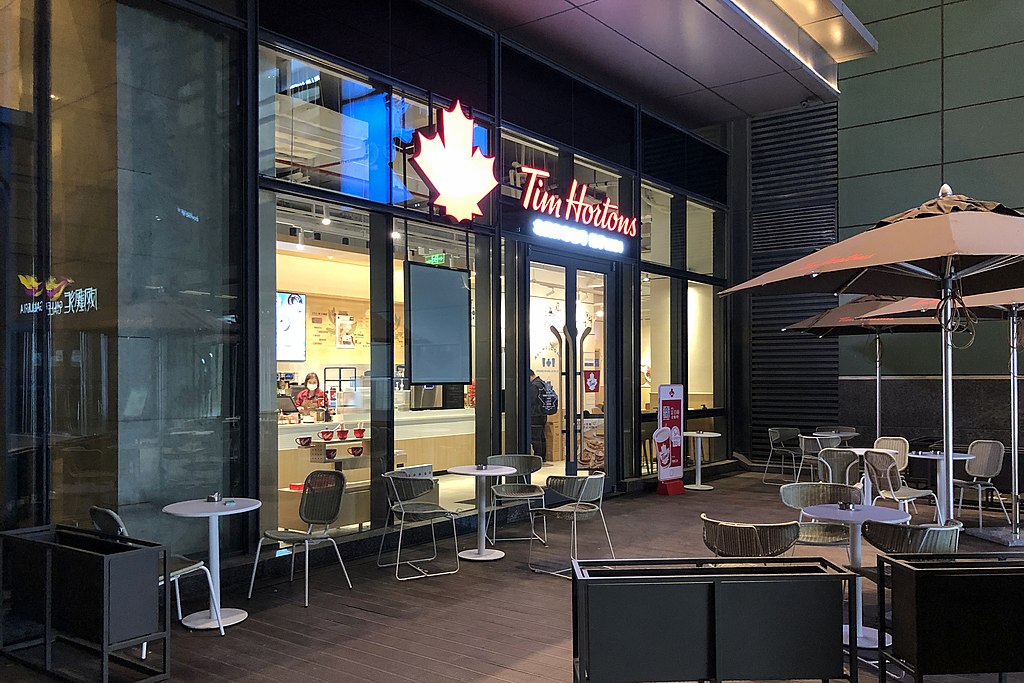By Alec Roberson
At the beginning of the 2018-19 NHL season, a headline came out of Tampa Bay that the Lightning were terminating the contract of Jake Dotchin for what the Lightning considered was a “material breach of contract.” The cause of the termination and alleged breach based on reports: Dotchin showing up to training camp about 30 pounds overweight. Since that story was released, Dotchin was put on unconditional waivers (as is required in the NHL Collective Bargaining Agreement [“CBA”] and standard player’s contract [“SPC”] prior to termination of the SPC), his contract was terminated by the Lightning, the Anaheim Ducks signed him to a similar but less valuable contract, he was waived by the Ducks, has played with the Ducks and their AHL affiliate the San Diego Gulls and the NHLPA filed a grievance on his behalf. Pursuant to Article 17 of the CBA and the SPC, any breach of contract issue must be decided by an independent arbitrator. While there could be more facts and information in play that we do not know about, the substance of that grievance, and the source of the content of this article, involves the question of what actually is a “material breach of contract” as it relates to a NHL player’s SPC that would allow for a team to terminate that contract.
The Standard Player’s Contract
The first place to look to see what grounds exist to terminate the SPC is actually in the SPC itself, which is provided in the NHL CBA as an exhibit, as well as the CBA. Because the players and teams enter into the SPC pursuant to the CBA, state and local employment laws may not affect the outcome as much. According to the CBA, this form SPC must be used for each player and cannot be altered (with a few exceptions including salary, non movement clauses, etc.). This means that the language providing the ability for a team and/or player to terminate the contract is uniform across the board for every team and player in the NHL. The NHL’s SPC is what is considered a “guaranteed contract” meaning that teams cannot unilaterally terminate the SPC without some reason or “cause.” Notably, Paragraph 14 of the SPC states that:
The Club may also terminate this SPC upon written notice to the Player (but only after obtaining Waivers from all other Clubs) if the Player shall at any time:
a. Fail, refuse, or neglect to obey the Club’s rules governing training and conduct of Players, if such failure, refusal or neglect should constitute a material breach of this SPC.
b. Fail, refuse, or neglect to render his services hereunder or in any other manner materially breach this SPC.
The way that (a) is written makes it seem like the failure of a player to obey a team’s rules concerning training would still not grant the team the ability to terminate the contract unless it constituted a material breach. Likewise, (b) is constructed in a way that again makes it seem like there has to be a material breach before the team can terminate the SPC.
The only problem is that nowhere in the SPC nor the CBA is “material breach” specifically defined. Nor is there really any mechanism in either to determine what constitutes a material breach. Pursuant to Paragraph 4 of the SPC, each team may set out reasonable rules governing the conduct and conditioning of a player and those rules have the same force and effect as if they were written into the SPC. Such rules must be filed at the main offices of the NHL and the NHLPA so the player and the NHLPA is on notice. What is interesting is that Paragraph 4 also specifies that a player’s violation of those rules grants the team with the ability to either fine that player or suspend him. It does not say the team may terminate the contract. So a simple violation of team rules seems to not be enough to justify termination of the contract. But what is the difference in simply violating team rules and reaching the level of a material breach justifying termination? Well because it is not clear from the language of the SPC or the CBA, one must look outside of the SPC to figure out the parameters of what may constitute a material breach.
Plain Meaning, Construction and Policy
A material breach is generally seen in the legal world as a significant enough failure in the performance of a contract by a party to give the affected party the right to sue for damages release it from its obligations. This means that a material breach must be something substantially more than just a simple breach of a provision in a contract.
In most cases, there are certain presumptions and “rules of construction” generally applicable to contracts that may help define a material breach. However, because the contract in question here is the uniform SPC that was drafted under the CBA, some of these rules of construction may not be as applicable. Unless it is otherwise stated in the contract, there is a general presumption to construe the terms of a contract against the drafter of said contract. While this presumption may not be as applicable to the SPC under the CBA from a construction standpoint, there does seem to be strong policy reasons that arbitrators and judges would give deference to the players when it comes to that player’s right to earn a living. This “right to earn a living” is very important to arbitrators and judges and they generally will not allow the denial or deprivation of such a right without some extreme circumstance. It would seem that a team getting out of an obligation created by a contract for monetary or convenience would not be allowed.
Precedent
Possibly the most convincing resource to use to try to analyze and determine the parameters of what constitutes a material breach is to look at previous examples of terminations of players’ contracts for a material breach of contract. One of the most recent examples is from 2015 when the Los Angeles Kings attempted to terminate the contract of Mike Richards under the SPC. The NHLPA filed a grievance on Richards’ behalf and, unfortunately for this analysis, both sides ended up reaching a settlement. So while the arbitrator did not have the opportunity to make a decision on that termination, there are a few facts that make that situation very different from Dotchin’s. The first one is that Richards’ contract was terminated because he was stopped at the Canadian border with illegitimate prescription drugs. This is markedly different than Dotchin who showed up to training camp overweight. One could at least argue that Richards’ situation bears more on the team’s reputation and his character while Dotchin’s situation seems to reflect more on his value as a player and how it helps the team. It would seem that the Richards situation would at least come closer to justifying termination for a material breach of contract, but we were left without a final decision to get a better idea. On the flip side to this thought is the question as to why the Kings did not attempt to use the NHL/NHLPA Substance Abuse Program to help Richards and instead went straight to contract termination. That factor may point a little more to bad faith on the part of the Kings.
Another factor that is very different is the remaining salary on these two players at the time of termination. Richards had five years and $22 million left on his contract when the Kings sought termination while Dotchin was only entering the second year of a two year, $1.625 million deal. By this metric,one could argue that the Kings were looking for a way to get out of paying Richards (as his play had noticeably declined) and that the Lightning’s intentions could be more “pure” (to the extent that word can be used here). Of course there are other motivations that may have influenced that decision, but as far as looking at ridding the team of Dotchin’s contract, there isn’t exactly a huge monetary benefit. This would likely be something the arbitrator would take into consideration to prevent teams from creating an essentially backdoor way to make guaranteed contracts non-guaranteed.
The problem with using precedent to try to get an idea of how a material breach may be defined is that there just simply does not seem to be a lot of examples to go by in the NHL. Neither Danny Heatley’s vehicular homicide incident nor Mark Bell’s DUI and hit and run incident lead to their respective teams attempting to terminate their contracts due to a material breach. Zack Kassian was only suspended without pay, pursuant to the SPC, and ordered to take part in the NHL/NHLPA Substance and Abuse Program by the Montreal Canadiens after he was involved in a car accident. Likewise, Section 4 of the SPC was used to allow the St. Louis Blues to suspend Grant Fuhr in 1995 and Keith Tkachuk in 2006, both for showing up to camp overweight. In neither instance were those players contracts terminated or even attempted to be terminated by the Blues. Attempts at unilateral termination of the SPC is just not seemingly a common thing. Nor is the allowance for unilateral termination of the SPC something that really seems to be the intention SPC as it is drafted.
In the NFL, contracts are not guaranteed so this issue would not really come up. However, this issue has come up in both the MLB and the NBA. An arbitrator in the MLB reversed the termination of the contract of Lamarr Hoyt after he was arrested and sent to prison for trying to cross the border into the United States from Mexico with illegal prescription drugs. Later an arbitrator upheld the termination of Shawn Chacon’s contract after he grabbed Houston Astros General Manager Ed Wade by the neck and threw him to the ground while an arbitrator in the NBA reversed a termination of the contract of Latrell Sprewell for choking his head coach. While these rulings are not very consistent, nor are they binding on the NHL, one thing that is common in all of these is that they are seemingly more extreme instances than a player showing up to training camp out of shape.
While the decision by the arbitrator involving Dotchin could really go either way, under the notion that both arbitrators and judges really look to protect individuals’ right to make a living, it seems that showing up to training camp out of shape, even grossly out of shape, is likely not enough to constitute a material breach. This is especially true when you consider there are other means (“less restrictive means” if you will) by which the team could try to at the least partially rid itself of that player and his salary such as trading, waiving, or buying him out. But at the same time, there is an expectation for that player to perform at a level to which he was expected to and for lack of a better phrase “do his job.” This is a grey area with not a lot of guidance to go on that the arbitrator will have to to carefully consider.
Implications
While it may not be fair to exactly say this is “uncharted territory,” as stated above, utilizing the material breach of contract provision in the SPC to terminate a player’s contract seems to be a rare occurrence. Maybe the Lightning are trying to use this to set a new precedent and test the waters on a new way for teams to rid themselves of bad contracts. It would make sense right? Worst case scenario they pay Dotchin the remainder of his salary he would have been due with the Lightning, which is relatively not much. Maybe they purely believe Dotchin’s condition warranted a material breach. Either way, much like during the attempted termination of Mike Richards’ contract, there is no way the NHLPA wants to accept this as a new “standard” by which teams may simply terminate contracts of players. A player breaking the law is one thing, but showing up to camp out of shape, if considered adequate grounds for termination, is seemingly another that could lead to more uncertainty with what defines a material breach.
Another implication that may arise as a by-product of both Dotchin’s and Richards’ situations is how they may affect CBA negotiations coming up in a few years. To my knowledge this has not been a focal point of CBA negotiations, but the NHLPA may see this as an issue potentially swaying the balance of power in the SPC (and for that matter the NHL/NHLPA relationship as a whole) as more favorable to the teams and league than to the players. The NHLPA definitely does not want the SPC to turn into a de-facto non-guaranteed contract. Is it a big enough issue to cause another work stoppage? It may depend on the outcome of Dotchin’s situation but that’s hard to say. One thing that is certain is that the slope is slippery when it comes to the decision on Dotchin’s contract. Not necessarily for Dotchin’s personal sake, but for the effect it could have on the balance of power between the players and the owners in the NHL. It will be very interesting to see what the arbitrator decides as well as the rationale of that decision and the potential long term effects of this situation and that decision.
**UPDATE** In July of 2019, Dotchin and the Tampa Bay Lightning reached a settlement and avoided the need of an independent arbitrator deciding the outcome. As was the case with Mike Richards mentioned above, both sides here have avoided an actual ruling on the question at large and have instead worked it out on their own. The terms of this settlement do not seem to have been publicly disclosed. While this is probably better for the parties involved, we again are left with only a vague understanding of what a true “material breach of contract” may amount to under an NHL SPC. I am sure it will only be a matter of time for this issue to arise again.
Post image attribution: By: TheAHL [CC BY 2.0 (https://creativecommons.org/licenses/by/2.0)], via Wikimedia Commons




